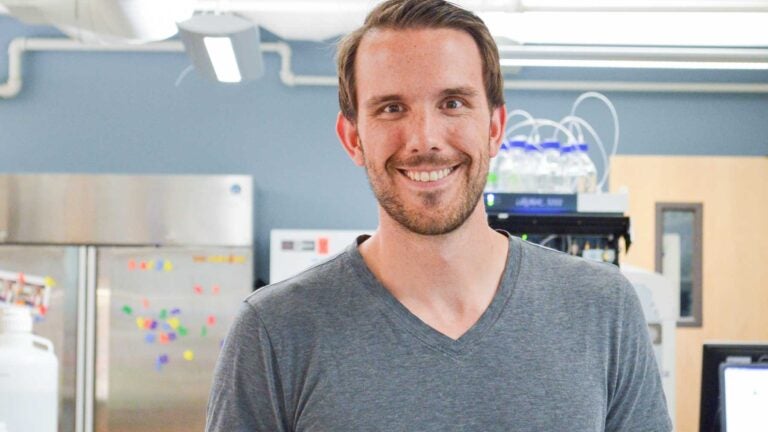
Joseph Reynolds is a PhD candidate at USC. (Photo/Beth Newcomb)
The molecule that might fight off frailty and foster fitness as we age
USC Davis doctoral student’s research looks at muscle mass and improved physical performance
A unique molecule that’s naturally found in the body could be a potent fighter of aging. Now USC researchers are uncovering more about how it works — including whether it might offer different effects at different ages.
The peptide MOTS-c and its effects on metabolism were first described in 2015 by Changhan David Lee, assistant professor at the USC Leonard Davis School of Gerontology. MOTS-c seems to mimic the effects of exercise when it’s given to mice — increasing their insulin sensitivity and preventing obesity, even if the animals eat a high-fat diet.
Further research shows that mice that received injections of MOTS-c maintain more lean muscle mass, build up less body fat and perform better on tests of physical function than other mice. The treated mice voluntarily run faster and for nearly twice as long on a treadmill compared to mice who don’t receive the peptide, according to Joseph Reynolds, a doctoral student in the USC Davis’ Biology of Aging program. Lee is Reynolds’ mentor.
Now Reynolds and his colleagues want to uncover how MOTS-c improves this performance. Their findings might have important implications for keeping people healthier as they age.
The next phase
Reynolds is studying how the effects and mechanisms of MOTS-c treatment vary between mice of different ages. Current research has only been performed in mice of similar ages.
If the positive early results eventually make their way into human medicine, Reynolds said his hope is that MOTS-c treatment could help stave off physical decline in human beings as they age.
Our hope is that this could one day prevent frailty in older adults, help them maintain muscle mass and perhaps even decrease their risk of falling.
Joseph Reynolds
“Our hope is that this could one day prevent frailty in older adults, help them maintain muscle mass and perhaps even decrease their risk of falling,” he said.
Reynolds’ newest research will be supported by the 2017 Glenn Foundation for Medical Research/American Federation for Aging Research Scholarship, which provides $5,000 for a three-to-six-month research project into biomedical aspects of aging.
The scholarship program gives students the chance to learn more about aging research and better understand the challenges involved in improving the quality of life for older people.
